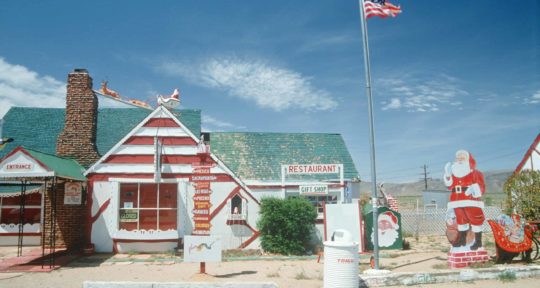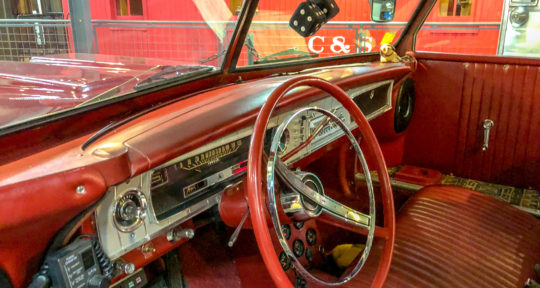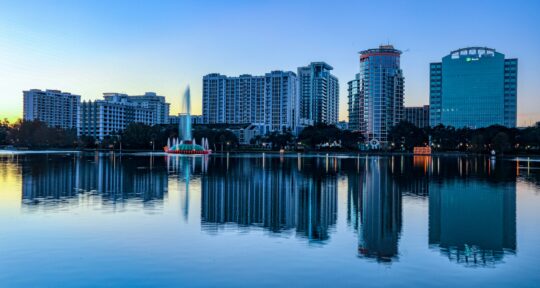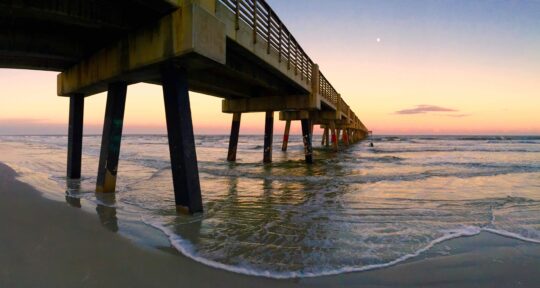Did you guys know that more vacation improves job performance? And that working remotely does too? Clearly, the internet is lousy with research and listicles about the benefits of travel and remote work. You’ve probably seen them pop up on your Facebook feed or Twitter timeline. But we all know that talk is cheap; does traveling and working remotely improve your work performance… and, more importantly, does it make you happier?
Hailey and Mitch were two New Yorkers who got burnt out from, as they say, “the grind”… so they did what we all wish we could do and took off on a road trip across the country. But rather than quit their jobs or explain to their bosses that they wanted to work remotely while on an epic cross-country road trip… they just didn’t tell anyone. It turned out to be the ultimate experiment to find out if working remotely and traveling actually do make you happier and better at your job. Turns out the answer was, for Hailey and Mitch at least, an emphatic “yes”! Here’s the lowdown on how they were able to work remotely without telling their employers, from what they told their bosses initially (and how the bosses reacted along the way) to their budget.
What was life like for you guys before you hit the road? What inspired the change?
We were both New York City dwellers in 2016. Hailey started feeling burnt out from her 12-hour workdays sandwiched between hour-long subway rides, and that frustration lined up serendipitously with Mitch’s vexation over the recent hiring of an executive who was crushing team morale.
We were itching for a change of environment, but didn’t want to bail on our teammates given that both of us were involved in nurturing corporate culture… so we thought up this traveling experiment to make a case for improving work/life balance.
What did you tell your respective jobs you guys were planning on doing? Did you have a hard time convincing them to let you work remotely?
Our initial step was a move to Florida to spend time with family (and to establish a geographic boundary with our employers), so that’s how we pitched it. Hailey had prepared a whole slew of selling points on going remote, like the actual increase in availability the company would gain from her not spending two hours each day standing on a train — but what made it possible in the end was a restructuring of her role and more time spent in the field.
Mitch had been working from home all along, so for him it was more a matter of reminding management that there wasn’t any real business need for him to be in NYC rather than Florida.
Tell us about your ride.
Odie the Odyssey! He’s a regular ol’ Honda mom-mobile whose seats have been replaced with a mattress. Naturally there’s a bike rack and cargo box, but the most unique feature is the shelf we built to hang from the headliner. It stores all our outerwear and towels for easy access… seems like something every car should have, apart from the fact that it would probably sever our heads if we ever rear-ended someone.
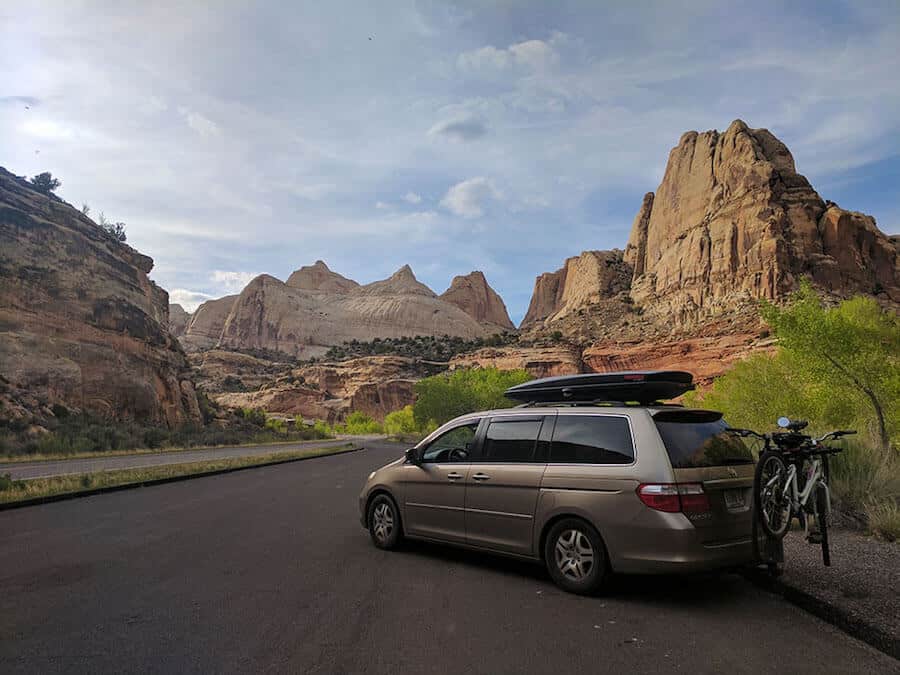
We had some key criteria for the vehicle:
1. Cheap and easy. Partially because it’d be our first time living together (and biggest investment as a couple), and partially because the spirit of Rogue Trip is that it’s doable. So not like, doable for the person who repairs diesel engines and builds tables… doable for the person who doesn’t think it’s doable. It has worked out well: two years into traveling, our total cost for the car plus equipment and maintenance is less than $15k, and the only major work done has been the A/C and catalytic converter.
2. Not a home on wheels. We wanted to experience as much of the U.S. as possible while working, and that wasn’t going to happen by cooking rice every day from a remote campsite. The van’s lack of kitchen and bathroom (and for a while, air conditioning) was a great motivator to get out of it and explore local cuisine, visit loved ones, utilize public facilities, and figure out how to maintain a decent data signal. Eating every meal out obviously got expensive, but all road trip vehicles are a compromise, which is what makes them interesting. We opted to spend our dough on food experiences rather than buy a ride with a stove. We are fat now.
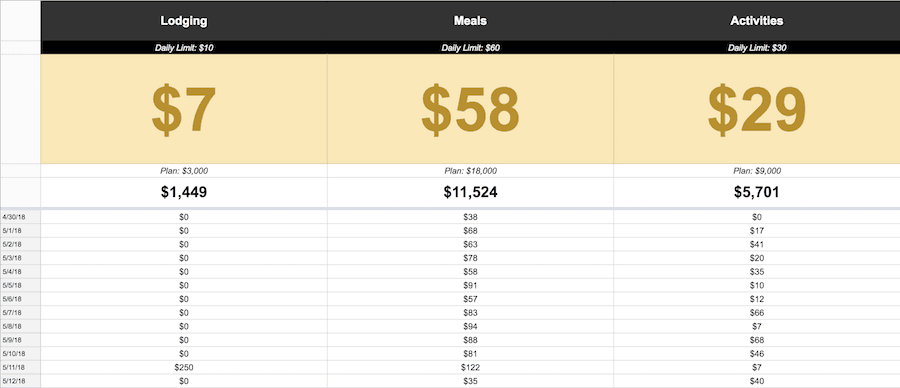
What special preparations did you need to make given the fact that you were pretending to be working full time from one remote location? How was it finding WiFi and places to work?
Connectivity is the obvious consideration, and for that we have to say a signal map app like Sensorly is a must-have. It’s an extremely reliable predictor of signal strength, and there were many occasions when we used it to re-route ourselves towards a good signal. From there it was just a matter of having phones with unlimited data plans and mobile hotspot features. The technology really made this possible.
The other big prep step worth mentioning is less technical, but important to anyone trying to improve work/life balance: you have to acclimate yourself and your company to being asynchronous, i.e. untied from real-time communications as much as possible. We’ve started talking about this on our blog, as there are many strategies and tactics to employ — but the gist is that you have to make yourself and everyone around you more accountable if you want to take control of your time.
How did you balance working, traveling from place to place and exploring? Do you feel like work got in the way of travel, or that travel got in the way of work?
That goes back to the discipline of being asynchronous with our work. Apart from a few inescapable projects, we really covered a surprising amount of ground and experiences. But we were still on a schedule, so any adventure that would leave us disconnected for the entire day and couldn’t be done on a weekend had to be ignored. The list of misses is etched into our brains: White Sands National Monument, The Narrows hike at Zion National Park, Albuquerque’s Balloon Festival… and failing to see a single moose despite being in the right places at the right times, many times over. If anyone reading this is a moose, please get in touch.

Did traveling full time affect the quality of your work or your productivity? What did you learn from your experiences?
This is really where the experiment proved to be a success, as neither of us had our performance questioned at any point. Rather comically, Mitch’s boss actually praised him for a behavioral improvement about six months into the journey.
Hailey eventually fell victim to a company layoff (unrelated to performance), at which point she disclosed her story. But a few months later, the company brought her back on board in full support of her travels.
Our performance record really seals the argument: if a manager wanted to use this story as justification for prohibiting travel during work, they’d have a hard time defending their decision given that our companies couldn’t tell the difference.
What was the hardest part about pretending like you weren’t on the road? Were there any close calls or particularly stressful situations you found yourselves in?
You never notice how often people ask about the weather until you have to lie about it.
We did have one funny situation on a conference call where Mitch made mention of the time being 11:30am, which was Mountain Time, which was obviously not Florida. After that snafu, we changed all our clocks to Eastern Time. Mitch recently went so far as to change his phone to military time, ensuring he’d pretty much always have to pause and think before reading a clock.
What was your route, and how did you decide it? Where were some of the best places you visited?
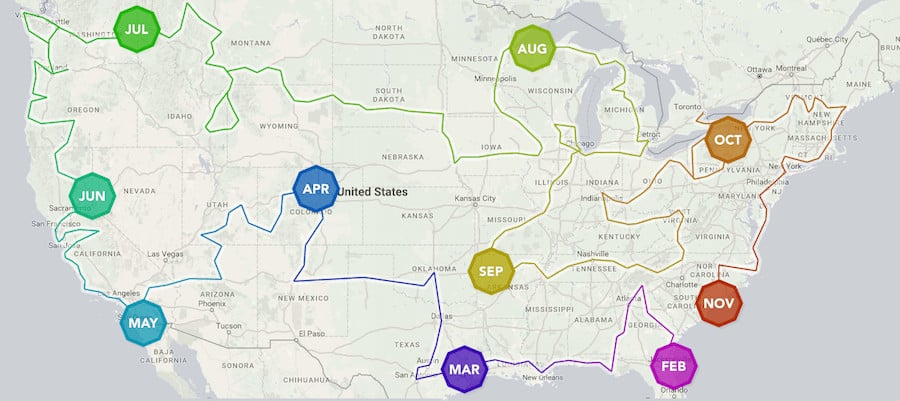
The skeleton of the of the route was based on maintaining good van sleeping weather while seeing as many states as possible, so that gave us an idea of general direction. From there we plotted our short list of must-haves: people we wanted to see, activities we wanted to partake in, national parks we wanted to visit, etc.
Once we had that rough path sketched out, we tweaked each leg from point-to-point using Roadtrippers and Google Maps, both of which are great tools for leading you down the rabbit hole of options. Plenty of locals chimed in with their input as well!
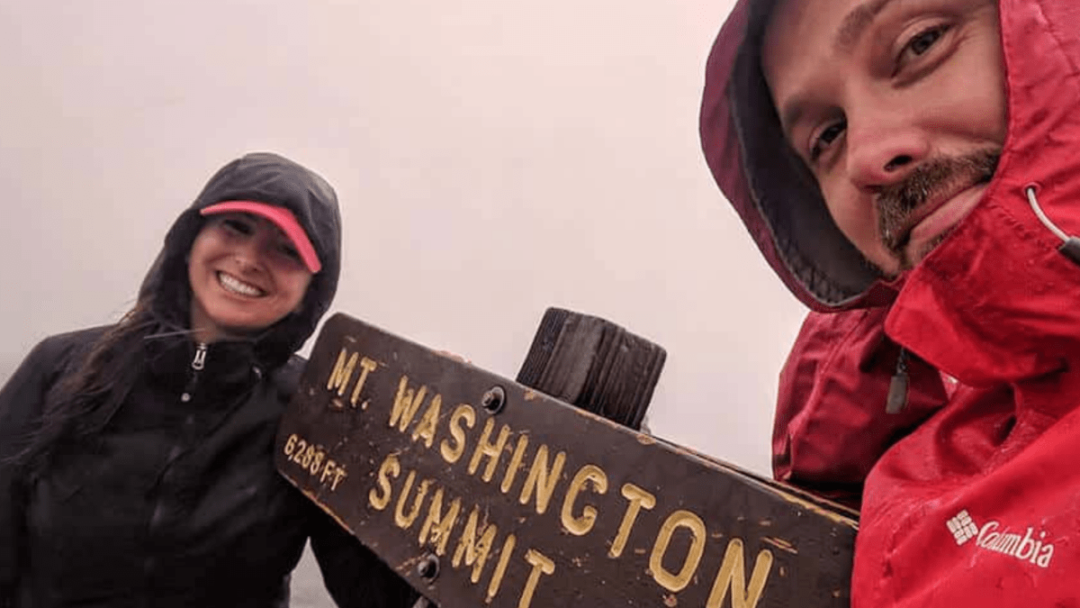
Favorite places? We don’t want to make any enemies so maybe we’ll just call out the stuff we feel is most underrated: Lake Michigan in the summer, the whole state of Idaho, Florida’s nature coast… but the whole country is really pretty damn impressive. Snow in July is pretty tough to beat
Where are you guys now? What are your plans for the future?
We’re well into our second year of the adventure; for this go-round, we’ve been doing more in-depth exploring of the regions we really enjoyed in 2017. We’re wrapping this year up in the Vermont area before doing our usual winter holiday family tour.
As part of the second approach, we established a sort of “day rental” scenario with locals who have 9-5 jobs: we pay them a few bucks, and get access to their home while they’re at work so we can shower and charge our gear before heading out in the van.
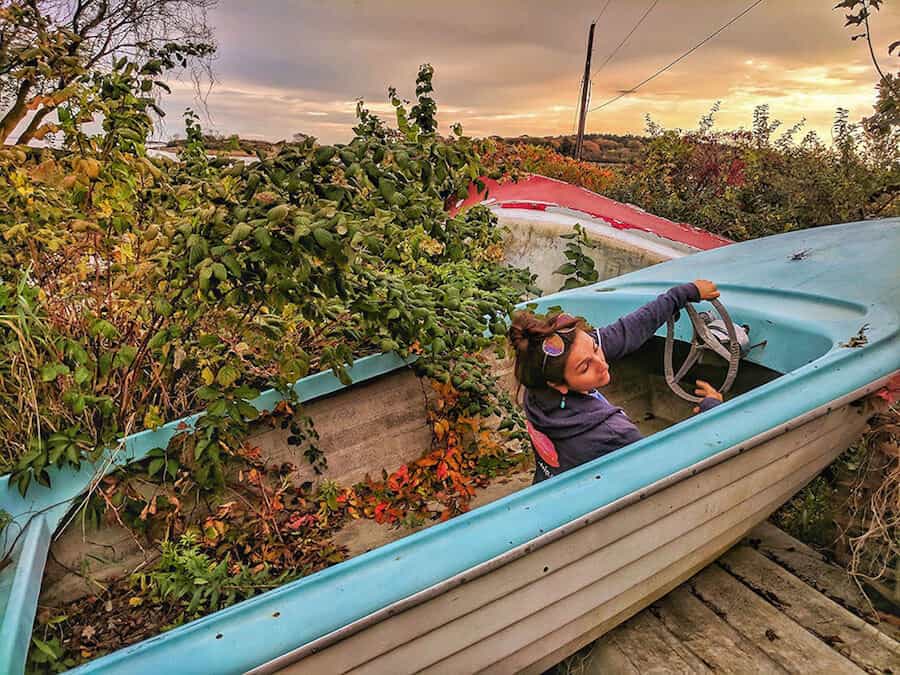
After that, we’ll lay low for a few months and do normal people things we’ve missed out on, like showering regularly. But… we’re starting to plan out a Vancouver-based year, so we welcome any help with that!
Would you hit the road without telling your jobs again? Do you recommend the experience to others? What are your suggestions for those who want to travel while still keeping their jobs?
We’re really happy with the experiment as a proof point to companies everywhere that their fear of employee freedom is unfounded and unjustifiable, but we did it to inspire change — we want employers to see this as a sign that remote work needs to be in their workforce engagement toolbox. At this point, we’re more focused on helping companies see the light, and helping people make a strong business case to take their jobs out of the office.
That’s our practical suggestion: think about how this makes sense to your employer. An increase in your available productive hours and mental clarity rather than a rigid block of often-useless hours, or the potential to swap some of your salary for a travel-friendly arrangement, or the opportunity to team up in creating a process for managing remote employees, which the company can then use to attract talent from all over the country. There are plenty of ways remote work can add value to businesses and communities.
What everyone really wants is the transparency to have these kinds of conversations productively and without fear of repercussions. Rogue Trip exists to prove that failing to embrace such transparency is no longer a luxury companies can afford.
Follow along with Mitch and Hailey as they work and continue to travel the country on Instagram (@roguetripusa) or on their blog, Rogue Trip. (All photos courtesy of Rogue Trip.)
